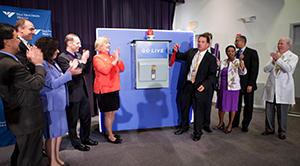
Popular Locations
- Yale New Haven Children's Hospital
- Yale New Haven Hospital - York Street Campus
- Yale New Haven Hospital - Saint Raphael Campus

Allen Hsiao, MD, remembers the “old days,” when a critically ill patient transferred from another hospital to Yale New Haven Hospital would arrive with a stack of papers.
“The receiving team would be trying to stabilize the patient, while sorting through the paperwork for the patient’s medical history, test results and other information,” said Dr. Hsiao, chief medical information officer, Yale New Haven Health and Yale School of Medicine (YSM). “A lot of times, we would repeat tests so we could treat the patient as quickly as possible.”
They might feel like the “old days,” but it was only 10 years ago that YNHHS’ Board of Trustees voted to adopt Epic, a comprehensive patient care and business software platform.
“Epic is not an information technology project,” YNHHS CEO Marna Borgstrom said at the time. “It represents a culture shift.”
It took two years to customize the platform to meet YNHHS’ needs, but in 2012, Greenwich Hospital launched Epic, followed by other YNHHS delivery networks, Yale Medicine and additional physician practices.
Since then, Epic has helped dramatically improve care quality, safety and efficiency and streamline business operations. While it has numerous components and features, Epic is based on a simple premise: Create one electronic medical record for each patient that can be easily and securely shared.
“Epic implementation remains one of the single most impactful efforts around clinical and operational integration within our health system and with Yale Medicine,” said Lisa Stump, senior vice president and chief information officer, YNHHS and YSM.




According to Stump and other Epic proponents, tools and functions that have had the biggest impact at YNHHS include:
Data collection: Epic collects an enormous amount and variety of data that can be used to improve patient care and operations. YNHHS’ Capacity Coordination Center is one example of how real-time Epic data help ensure patients receive appropriate, timely care in the right settings. This was critical during the COVID-19 surge, when patient care units were relocated and reconfigured and staff deployed to different areas.
Epic clinical decision support tools provide alerts, reminders and recommendations to help clinicians improve patient outcomes. Tools include health maintenance reminders, order sets, documentation templates and best practice alerts. “Best practice alerts remind clinicians to re-assess or perform necessary tasks, as part of our mission to provide safe, quality patient care,” said Leslie Hutchins, RN, Clinical Informatics manager.
The MyChart patient portal makes it easy for patients to access their health information, interact with care providers and view and pay bills. At COVID- 19’s peak, YNHHS and Yale Medicine providers used MyChart to conduct 4,000 telehealth visits daily with patients, up from around 30 visits a week pre-COVID.
Barcode scanning for medication and blood administration and specimen collection helps prevent errors. “Epic supports the ‘five rights of medication administration’ – the right drug, right dose, right route and right patient, at the right time,” Hutchins said. Nurses scan barcodes on patients’ ID bands and on medications, blood products or specimen collection containers. Epic alerts the nurse of any discrepancies. Epic’s Rover app allows nurses to scan with their hospital smartphones. “This helped during the COVID crisis, because we didn’t always have to bring the WOWs (workstations on wheels) into patients’ rooms,” said Carol Salerno, RN, clinical nurse informatics specialist.
Biomedical device integration: Before, nurses obtained patients’ vital signs and manually entered them into the patient record, which had a potential for transcription errors. Epic interfaces with many different devices, including those that monitor vital signs. Information automatically flows into patients’ electronic health records, and is immediately available to a patient’s care team, throughout YNHHS and at physician practices with Epic access.
Steven Fleischman, MD, is with Obstetrics, Gynecology and Menopause Physicians, one of the first ambulatory practices to adopt Epic, in 2011. Before, staff faxed “hundreds” of patient records between the practice’s four office locations. A pregnant patient’s health records were updated every 28 weeks, and copies sent to YNHH to ensure Labor and Delivery had the most current information when the patient arrived for delivery.
With Epic, patients’ information is instantly available to anyone involved in their care – whether in the practice’s Guilford office, a YNHHS hospital or pediatric primary care clinic. Using the Epic HAIKU mobile app, Dr. Fleischman can securely access patient information on a cell phone or other mobile device.
“With Epic, we have all the information we need; we can easily communicate with other physicians and with our patients; and we’re not duplicating efforts,” said Dr. Fleischman, YNHH assistant chief of Obstetrics and Gynecology. “Epic is an incredible tool for helping us provide safe, coordinated care.”